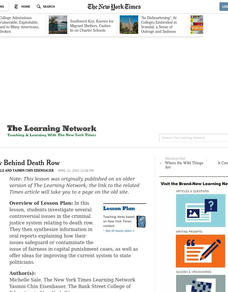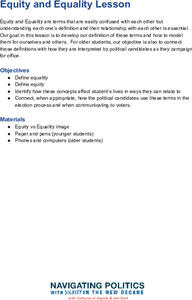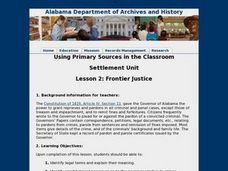Curated OER
Compliments can Change the World
Students explore the definition of philanthropy as it relates to bullying. In this moral values lesson, students listen to the book Thank you, Mr. Falker and identify how the main character was bullied. Students define philanthropy, and...
Curated OER
The Merchant of Venice: Anticipation Guide
Is justice blind? Is love blind? Before beginning The Merchant of Venice, readers decide whether they agree or disagree with statements that encapsulate key elements of the tragic comedy. The class then predicts whether Shakespeare will...
National Math + Science Initative
Reading an Informational Text: "It All Started with Sputnik"
Sputnik was one of the greatest scientific advancements of the 1950s, and this reading lesson does it justice. Pupils start off with pre-reading questions and a video. They then read an excerpt from an article, which is accompanied by...
Curated OER
Who's Boss in a Fairy Tale?
Students analyze the story of Cinderella to determine who is the authority and how justice works in the context of the story as well as determining which elements of the story could happen and which are fanciful.
Curated OER
Create Your Own Utopia
Learners identify and examine the history of Utopian societies of the 19th century. They analyze the novel "The Giver" to determine whether this is a fair society or not. Students also examine the differences between Jonas' society and...
Curated OER
Unfair Or Deceptive Sales Practices
Students explore fair and unfair practices in the judicial system. They are to find sources in their own community to find help for a problem.
Curated OER
American Justice on Trial
Students role play a trial in which they consider if the United States government violated the rights of Japanese Americans after Pearl Harbor.
Curated OER
Using Torture on Suspected Terrorists
Students asses the ethical, ideological, and political advantages both domestically and internationally. They analyze if it is beneficial to have terrorists share information or not and consider what is fair or unfair punishment for...
National Woman's History Museum
The National Woman’s Party
Two parties led the women's suffrage movement. The National American Woman Suffrage Association (NAWSA) was a moderate organization while the National Women's Party (NWP) was more militant. Young historians investigate why members of the...
Curated OER
American Political Culture
Examine American political culture with your scholars using this self-assessment instructional activity. Individuals rate a list of 14 values from highest to lowest, including ideas such as financial security, right to private property,...
Curated OER
Shakespeare's King Lear
Did your class just finish reading Shakespeare's King Lear? Test them with these ten multiple-choice questions covering the play. It's a fairly easy, simple quiz.
Judicial Learning Center
Types of Court Cases
How can one court acquit someone of a crime, while another convicts the person of the same one? It's all because of the differences between civil and criminal trials. An informative resource provides scholars in the field of criminology...
Judicial Learning Center
Getting Ready for Trial
A courtroom can be a scary place for the uninitiated. Get familiar with the process using a helpful overview of the activities that take place prior to both civil and criminal cases. The lesson explains the differences between civil and...
Southern Poverty Law Center
Choosing Reliable Sources
It is more important than ever that 21st-century learners develop the skills they need to become savvy consumers of media. Young learners locate and identify reliable sources of information with a helpful media instructional activity.
Curated OER
For The Sake Of Security: U.S.A. Patriot Act & Bill of Rights
A substantive New York Times article about the U.S.A. Patriot Act, military tribunals, racial profiling, and the Bill of Rights forms the basis for a discussion of the complex interplay of fundamental American rights and the aftermath of...
Judicial Learning Center
Your Day in Court
Whether out of choice or necessity, people want to know what will happen on a typical day in court. A helpful lesson walks scholars in the field of criminology through the trial process from opening statements to the final verdict.
Judicial Learning Center
The Judge and the Jury
Unless you are a lawyer, you might not understand just how unrealistic Law and Order and other legal dramas actually are. Here's a great resource to help scholars of criminology gain a more realistic perspective. The lesson outlines the...
Curated OER
Just-Us and Kindness: On Our Terms
Learners consider their citizenship responsibilities in the world. For this philanthropy lesson, students define civic virtues as they consider how to be fair, just, and tolerant to promote human rights. Learners complete a graphic...
Curated OER
Freethought Day Lessons
Freethought Day provides a way for students to discuss the current justice system.
Curated OER
The Row Behind Death Row
Students investigate several controversial issues in the criminal justice system relating to death row and give oral reports explaining how their issues safeguard or contaminate the issue of fairness in capital punishment. They offer...
Just Health Action
How are Equality and Equity Different?
Equality does not equal equity. That's the take-away from a lesson that asks young people to consider what could be done to make a variety of situations more just, more equitable. After examining images that illustrate the difference...
Cultures of Dignity
Equity and Equality Lesson
Equality does not equal equity and this lesson explains why. Class members compare two images--one labeled "Equality" and the other "Equity." Using the provided discussion questions, they then develop definitions that distinguish between...
Curated OER
Are Curfew's Fair?
Students explore and discuss how curfews are set up. They discuss how difficult it can be to define appropriate and inappropriate behavior. Students role play situations involving curfew and the behaviors they are meant to curb.
Curated OER
Frontier Justice
Students make an investigation into the Constitution of 1819, Article IV, Section II, gave the Governor of Alabama the power to grant reprieves and pardons in all criminal and penal cases, except those of treason and impeachment, and to...

























